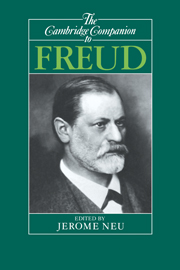Book contents
- Frontmatter
- Introduction
- 1 Freud: The psychoarcheology of civilizations
- 2 Seduced and abandoned: The rise and fall of Freud's seduction theory
- 3 Freud's androids
- 4 The interpretation of dreams
- 5 The unconscious
- 6 The development and vicissitudes of Freud's ideas on the Oedipus complex
- 7 Freud and perversion
- 8 Morality and the internalized other
- 9 Freud on women
- 10 Freud and the understanding of art
- 11 Freud's anthropology A reading of the “cultural books”
- 12 Freud's later theory of civilization
- 13 In fairness to Freud: A critical notice of The Foundations of Psychoanalysis, by Adolf Grünbaum
- Bibliography
- Cited works of Freud
- Index
- Series list
1 - Freud: The psychoarcheology of civilizations
Published online by Cambridge University Press: 28 May 2006
- Frontmatter
- Introduction
- 1 Freud: The psychoarcheology of civilizations
- 2 Seduced and abandoned: The rise and fall of Freud's seduction theory
- 3 Freud's androids
- 4 The interpretation of dreams
- 5 The unconscious
- 6 The development and vicissitudes of Freud's ideas on the Oedipus complex
- 7 Freud and perversion
- 8 Morality and the internalized other
- 9 Freud on women
- 10 Freud and the understanding of art
- 11 Freud's anthropology A reading of the “cultural books”
- 12 Freud's later theory of civilization
- 13 In fairness to Freud: A critical notice of The Foundations of Psychoanalysis, by Adolf Grünbaum
- Bibliography
- Cited works of Freud
- Index
- Series list
Summary
In his last decade of life Sigmund Freud turned once more to a question that had troubled him ever since he published his conception of the psyche in The Interpretation of Dreams in 1900: What were the implications of individual psychodynamics for civilization as a whole? His mature reflections on that subject he set forth in Civilization and Its Discontents (1930a). Its somber conclusions have, of course, become part of our self-understanding: that the progress of our technical mastery over nature and the perfection of our ethical self-control are achieved at the cost of instinctual repression in the “civilized” man - a cost so high as not only to make neurotics of individuals, but of whole civilizations. An excess of civilization can produce its own undoing at the hands of instinct avenging itself against the culture that has curbed it too well.
One might expect that, in making a point so historical in its essence, Freud would have reached out to propose a scheme of civilization's march toward the organization of nature and the collective development of the superego. Such was not Freud's way. He approached his problem not historically but analogically, proceeding from an analysis of the individual psyche, its structure and experience, to the functioning and future of society. Yet to introduce his reader to the difference between the psyche and history, he had recourse to an ingenious historical metaphor."
- Type
- Chapter
- Information
- The Cambridge Companion to Freud , pp. 8 - 24Publisher: Cambridge University PressPrint publication year: 1991
- 2
- Cited by



